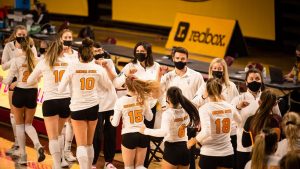- Slug: Sports-ASU Volleyball, 764 words.
- Photos Available
By Obren Manjencich
Cronkite News
PHOENIX – Using their backgrounds as a recruiting tool, Arizona State’s volleyball coaches are bringing international talent to the desert and helping them succeed on the court.
Despite the team’s 1-9 record, the Sun Devils can be heard in more ways than one, with international players relaying supportive chants in their native languages and coaches giving commands from the sidelines with their respective accents.
But the team collectively speaks one language: volleyball.
Since being named head coach in 2016, Sanja Tomasevic has explored the globe, bringing a handful of international players to Tempe in an effort to help her build a competitive roster with a unique presence.
For players coming from overseas, adjusting to life in the states can be daunting but exciting, and adapting to a new culture is part of the process.
Sophomore outside hitter Iman Isanovic’s journey to Arizona State was rather quick.
She committed to the program after playing with a former teammate of Tomasevic’s, who spoke highly of her, when she was with the Bosnian national team qualifying for the European Championship.
“I was committed in three days after first speaking (with) Sanja,” Isanovic said.
Isanovic maintains a strong relationship with Tomasevic through their comparable traits.
“She and I are very similar personality wise, so it was easy for us to connect,” Isanovic said.
Despite minor differences when speaking a similar language with Tomasevic, Isanovic often gives teammates a simple analogy when explaining the two.
“She speaks Serbian, I speak Bosnian, but at the end of the day it’s like British and American English, so I say ‘our language’ overall,” Isanovic said.
Isanovic had never been to the United States before coming to ASU, but relished the new opportunity that she kept in the back of her mind.
“I was always into American culture,” Isanovic said. “I started watching Cartoon Network since I was 4 years old. I grew up on that.”
Isanovic flourished in making the transition a season ago, when she recorded 216 kills for the Sun Devils, which was fifth on the team and the most for a freshman.
Roberta Rabelo, a freshman outside hitter from Brazil, is a new member of this year’s team and just the fourth Brazilian player to join the program.
Rabelo highlighted why coming to the states was a tantalizing prospect.
“In Brazil we don’t have professional athlete and student at the same time, “ Rabelo said. “You can not have a balance between both and here you have it.”
Rabelo has found reassurance in knowing that associate head coach Carlos Moreno, who is also a native of Brazil, can relate to her transition.
“The mindset is similar so when I don’t understand something I can ask him and he understands me,” Rabelo said.
“I feel more comfortable, because I’m so far from home and nobody speaks my language so when I talk with him I feel at home,” she said.
Marta Levinska, a freshman outside hitter from Latvia, is also adjusting to life in the U.S. after establishing herself as a premier talent in her native country.
Levinska was named the best women’s player in the Baltic league for the 2019-20 season, in addition to being named the best women’s volleyball player in Latvia for back-to-back seasons.
Levinska’s decision to join the Sun Devils was straightforward, as they were the only team from the Pac-12 to give her an offer.
Coming to the Pac-12 provides Levinska with tough competition, as the conference features back-to-back national champion Stanford, and the ability to grow as a player which was a factor in coming to ASU.
“I knew that I would definitely improve if I came here,” Levinska said.
Levinska has already made an impact this season, being one of three players to start all 10 games and is currently second in kills behind Isanovic.
Unlike Isanovic and Rabelo, who share similarities with their coaches, the appeal of playing under international coaches was enough to create an enticing opportunity for Levinska.
“I liked (that) the coaches were also international.” Levinska said.
Time differences can also make adjusting to the U.S. complicated. Communicating with families becomes difficult, forcing players to change once normal routines.
“For me it’s nine hours,” Levinska said. “I usually talk in the mornings or pretty latish at night.”
Levinska remains unfazed by the situation.
“It’s manageable,” Levinska said. “If one of my family (members) wakes up earlier than I can definitely talk late at night.”
After making adjustments, players have settled into their new environments and stay focused on helping the team win in a tough conference filled with competition.
For more stories from Cronkite News, visit cronkitenews.azpbs.org.
